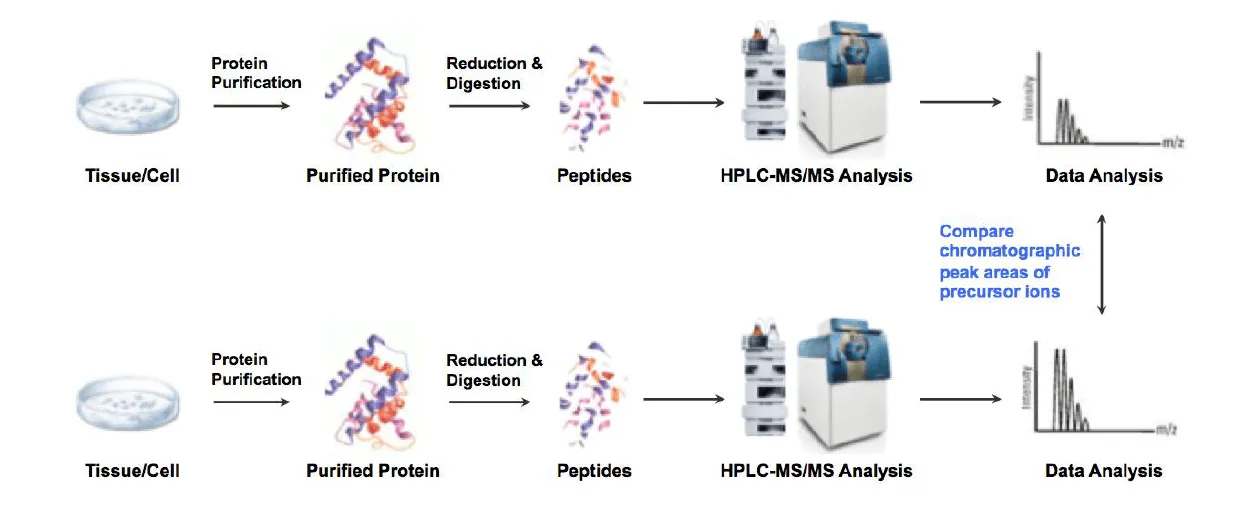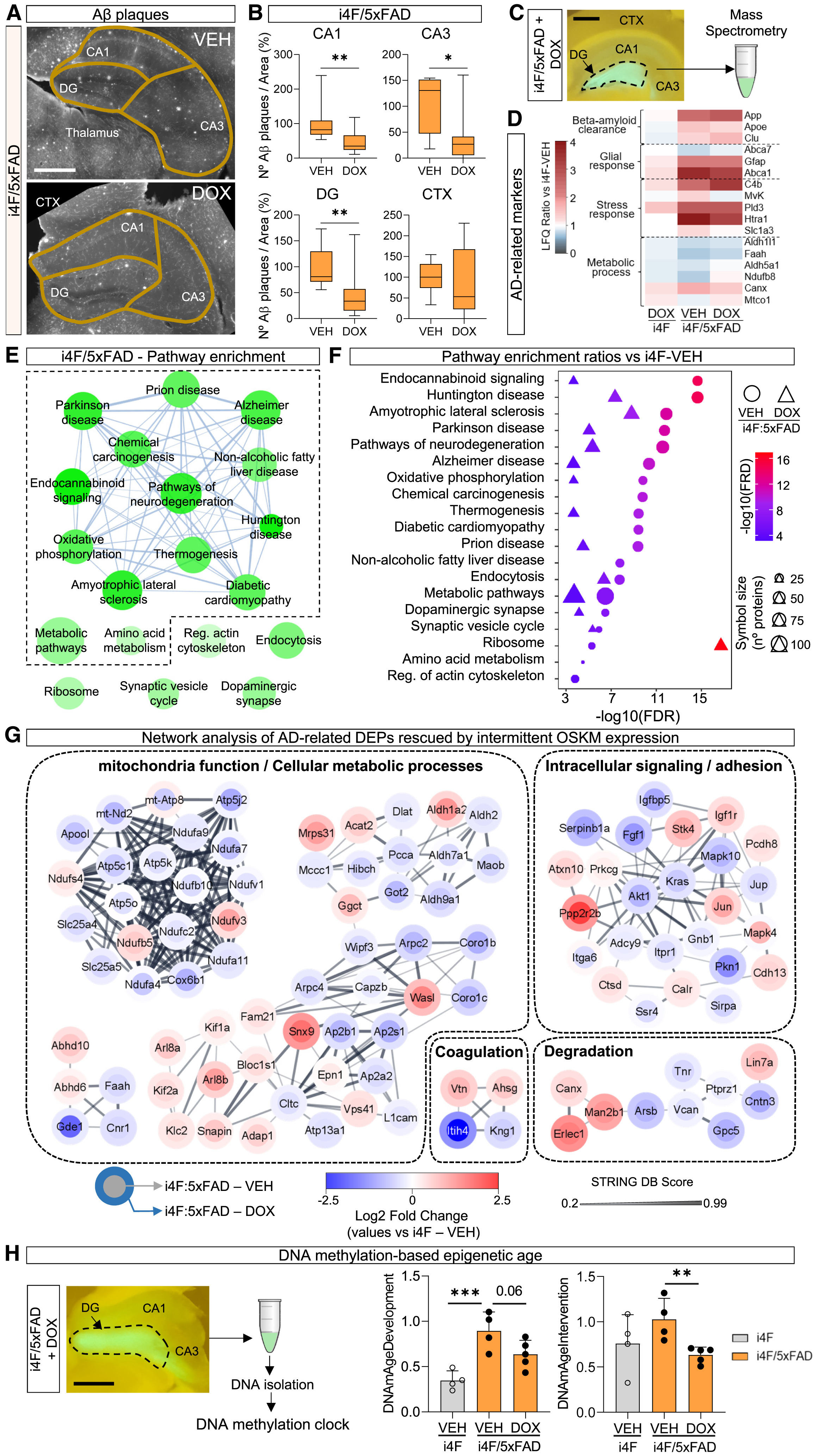Label-Free Quantitation Service
Label-free quantitation is a quantitative technique commonly used in mass spectrometry analysis to analyze changes in protein levels in biological samples without relying on any chemical labels or isotope labels. Label-free quantitation directly uses the ion intensity (or peak area) obtained in the mass spectrometry data to measure the relative abundance of proteins or peptides, because in mass spectrometry analysis the ion intensity (or peak area) of each protein or peptide is related to its relative abundance in the sample. Label-free quantitation service is particularly suitable for processing large-scale and complex biological samples. It has high flexibility and low cost and is widely used in proteomics research. Based on advanced chromatography and mass spectrometry platforms, MtoZ Biolabs provides label-free quantitation service to help customers obtain differential data on protein expression in samples without the use of labels or chemical markers.
Analysis Workflow

The general process of label-free quantitation service is as follows:
Sample preparation and protein extraction: Extract proteins from biological samples, and ensure that the proteins in the samples are of high quality and sufficient purity.
Protein digestion and peptide generation: Use enzymes (such as trypsin) to digest proteins into smaller peptides for mass spectrometry analysis.
Liquid chromatography-mass spectrometry (LC-MS) analysis: Peptides are separated by liquid chromatography and then enter the mass spectrometer for analysis to generate a mass spectrum.
Data processing and report: Data processing, peptide identification and quantitative calculation are performed using professional bioinformatics software. Output reports containing detailed protein quantitative data, change trends, enrichment pathways and other information.
Service Advantages
1. Advanced Analysis Platform: MtoZ Biolabs established an advanced label-free quantitation service platform, guaranteeing reliable, fast, and highly accurate analysis service.
2. One-Time-Charge: Our pricing is transparent, no hidden fees or additional costs.
3. High-Data-Quality: Deep data coverage with strict data quality control. AI-powered bioinformatics platform integrates all label-free quantitation service data, providing clients with a comprehensive data report.
4. No label required: Label-free quantitation service does not require any chemical labels, which simplifies the experimental process and reduces possible label bias.
5. Widely applicable: Applicable to any type of sample, whether it is complex tissue extracts, cell lysates, or proteins extracted from clinical samples.
6. High throughput: Label-free quantitation service can analyze the expression levels of thousands of proteins at the same time, with extremely high data acquisition capabilities.
Applications
Label-Free quantitative technology is widely used in the following research fields:
Protein function research
Study the functional changes of proteins under different physiological and pathological conditions, especially under disease models or drug intervention.
Biomarker screening
Use label-free quantitation service to screen out proteins with significant expression differences to help discover potential biomarkers.
Drug development
During the drug development process, label-free quantitation service can be used to monitor changes in protein levels and evaluate the mechanism of action of drug candidate molecules.
FAQ
Q. How to improve the reproducibility and accuracy of label-free quantitation, especially in the detection of low-abundance proteins?
In label-free quantitative analysis, the quantitative accuracy of low-abundance proteins is usually low because their ion intensity is low and they are easily interfered by the noise of the mass spectrometer or lost due to technical variations in sample processing. The following strategies can be used to improve the reproducibility and accuracy of quantitation:
Optimize sample pretreatment: Use more standardized sample processing methods, especially when dealing with complex samples. Centrifuging samples in steps and removing interfering substances can reduce background noise, thereby improving the detection sensitivity of low-abundance proteins.
Improve the resolution and sensitivity of mass spectrometry: Using a high-resolution and high-sensitivity mass spectrometer can improve the detection ability of low-abundance peptides and proteins. At the same time, choosing an appropriate mass spectrometry scanning mode (such as DDA or DIA) can further improve the comprehensiveness and quality of the data.
Repeatability of data acquisition: Perform technical replicates to improve the stability and reliability of the data, especially for the quantification of low-abundance proteins. Multiple technical replicates help distinguish true signals from noise, thereby improving the accuracy of quantitative results.
Improve the selectivity of peptides: Try to select more specific peptides with higher abundance in the sample for quantification. Low-abundance proteins are often quantified indirectly through their representative peptides.
Noise suppression and statistical analysis methods: Use appropriate denoising algorithms to remove background noise, and apply appropriate statistical methods (such as Bayesian statistics or linear regression) to process low-abundance protein data to reduce errors and improve signal reliability.
Case Study
The study used label-free quantitation to conduct proteomic analysis of mouse brain tissue at different time points during the transcription factor reprogramming process. Results showed that transient reprogramming significantly altered protein expression profiles related to neural development, synaptic plasticity, and cell survival, particularly by enhancing signaling pathways related to neuroprotection and repair.

Shen Y R. et al. Cell Stem Cell. 2024.
MtoZ Biolabs, an integrated Chromatography and Mass Spectrometry (MS) Services Provider, provides advanced proteomics, metabolomics, and biopharmaceutical analysis services to researchers in biochemistry, biotechnology, and biopharmaceutical fields. Our ultimate aim is to provide more rapid, high-throughput, and cost-effective analysis, with exceptional data quality and minimal sample consumption.
MtoZ Biolabs, an integrated chromatography and mass spectrometry (MS) services provider.
Related Services
Quantitative Proteomics Service
How to order?







